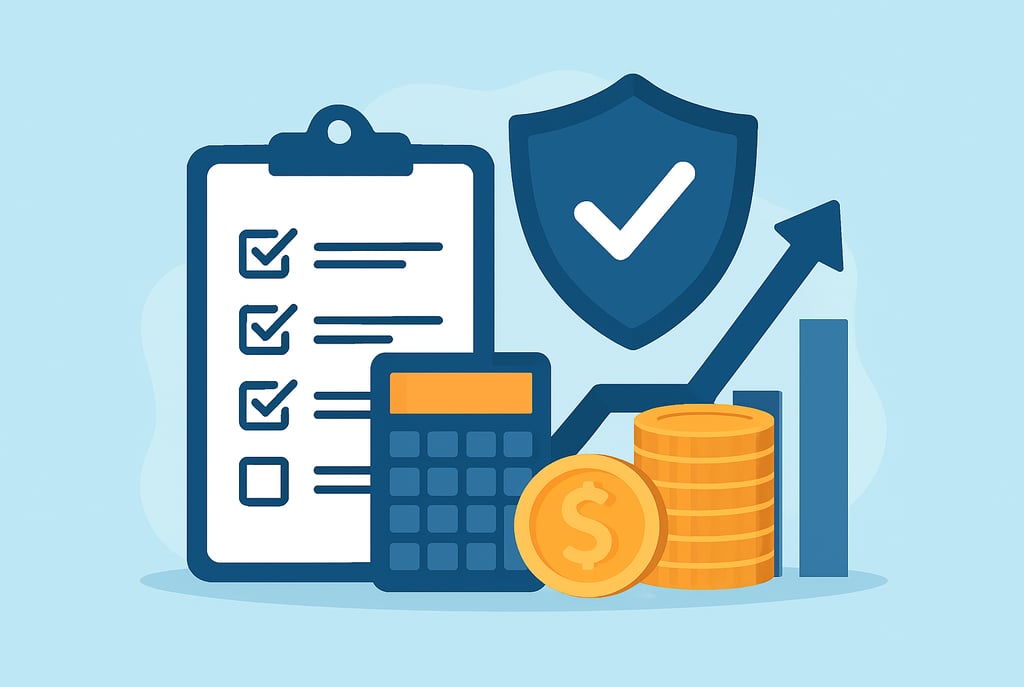The Power of Financial Discipline: How Small Habits Build Big Wealth
Learn how small daily habits and financial discipline can build lasting wealth, reduce debt, and lead you to true financial freedom.
8/19/20253 min read


When people imagine financial freedom, they often picture huge salaries, luxury lifestyles, or winning the lottery. But in reality, lasting wealth is not about sudden windfalls—it’s about consistency. Financial discipline is the ability to manage your money wisely, resist unnecessary spending, and commit to long-term goals. It may not sound glamorous, but it is the single most important factor that separates those who live paycheck to paycheck from those who build real financial independence.
What Is Financial Discipline?
Financial discipline is the practice of making intentional decisions with your money. It means spending less than you earn, saving regularly, investing consistently, and avoiding unnecessary debt. Importantly, it does not mean living without joy or depriving yourself. Instead, it is about finding balance—choosing what truly matters to you while ensuring that your future is protected.
In practical terms, financial discipline involves:
Budgeting and tracking expenses.
Saving automatically before you spend.
Delaying gratification instead of giving in to impulse purchases.
Investing regularly for long-term growth.
Learning to say “no” to expenses that don’t align with your goals.
Why Most People Struggle With Discipline
In today’s consumer-driven society, discipline is harder than ever. Social media constantly shows us images of luxury cars, vacations, and the latest gadgets. Credit cards and digital payments make overspending effortless. Many people are caught in a cycle of working hard, spending everything they earn, and never building wealth.
The problem isn’t lack of income—it’s lack of strategy. A person earning $3,000 per month with discipline can end up wealthier than someone earning $10,000 but living recklessly. That’s the true power of habits.
The Compound Effect of Small Habits
Financial success is rarely the result of one huge decision. It’s built on small, consistent actions over time. Think of it like going to the gym. One workout won’t change your body, but exercising regularly for months and years leads to transformation. The same is true with money.
Consider this:
Saving $5 a day (instead of buying coffee out) equals $1,800 a year.
Invested at an average return of 8% annually, that could grow into $26,000 in 10 years and over $100,000 in 30 years.
That’s the price of a home down payment or a comfortable retirement—built from a single small daily choice.
This is the compound effect in action. Your small habits—good or bad—compound over time. Discipline ensures that they compound in your favor.
The Role of Automation in Discipline
The easiest way to maintain discipline is to remove temptation. That’s where automation comes in. By setting up automatic transfers to savings or investment accounts, you save before you even have the chance to spend. This technique, often called “pay yourself first”, makes wealth-building effortless.
Some practical examples:
Direct deposit: Have 10% of your paycheck automatically transferred into savings.
Automatic investment plans: Contribute monthly to index funds or retirement accounts.
Bill autopay: Avoid late fees and protect your credit score.
With automation, you don’t rely on willpower alone. The system does the hard work for you.
Discipline and Debt Management
Another critical aspect of financial discipline is debt. Not all debt is bad—student loans or mortgages, for example, can be strategic investments. But high-interest consumer debt (like credit cards) is one of the biggest wealth destroyers.
Discipline means:
Avoiding unnecessary debt in the first place.
Paying more than the minimum on high-interest balances.
Using strategies like the debt snowball (paying off smallest debts first) or debt avalanche (paying off highest interest first).
Breaking free from debt is one of the most liberating financial achievements—and it requires strict discipline.
Long-Term Rewards of Discipline
In the short term, discipline can feel restrictive. It may mean saying no to a vacation, waiting an extra year before upgrading your car, or living in a smaller apartment while you save. But in the long run, discipline gives you freedom.
Imagine the difference:
Without discipline: Stress, living paycheck to paycheck, constant worry about bills, no savings for emergencies.
With discipline: Peace of mind, opportunities to invest, ability to handle emergencies, and the option to retire early or pursue passion projects.
The sacrifice today buys you independence tomorrow.
Key Takeaways for Lasting Financial Discipline
Track your money—awareness is the first step.
Create a budget and stick to it.
Save and invest consistently, even if it’s just small amounts.
Automate everything to make discipline effortless.
Avoid lifestyle inflation—don’t spend more just because you earn more.
Stay focused on long-term goals, not short-term pleasure.
Conclusion: Financial Freedom Is a Habit
Financial freedom is not about luck, chance, or earning the highest salary. It is about habits—consistent, disciplined actions repeated over time. Anyone can practice financial discipline. Anyone can build wealth.
The earlier you start, the more powerful the results will be. So start today. Track your expenses, set aside your first savings, and commit to one small disciplined habit. In 5, 10, or 20 years, your future self will thank you.
💡 Final Thought: Control your money now, and you will control your future later. Financial discipline is not punishment—it is the key to freedom.